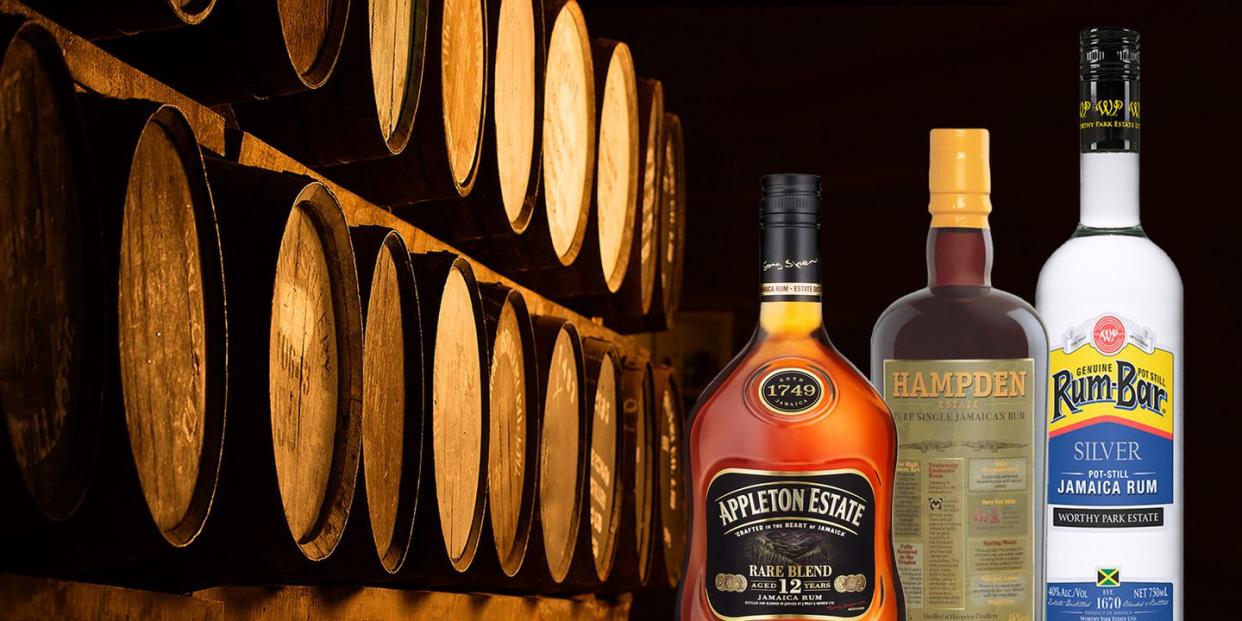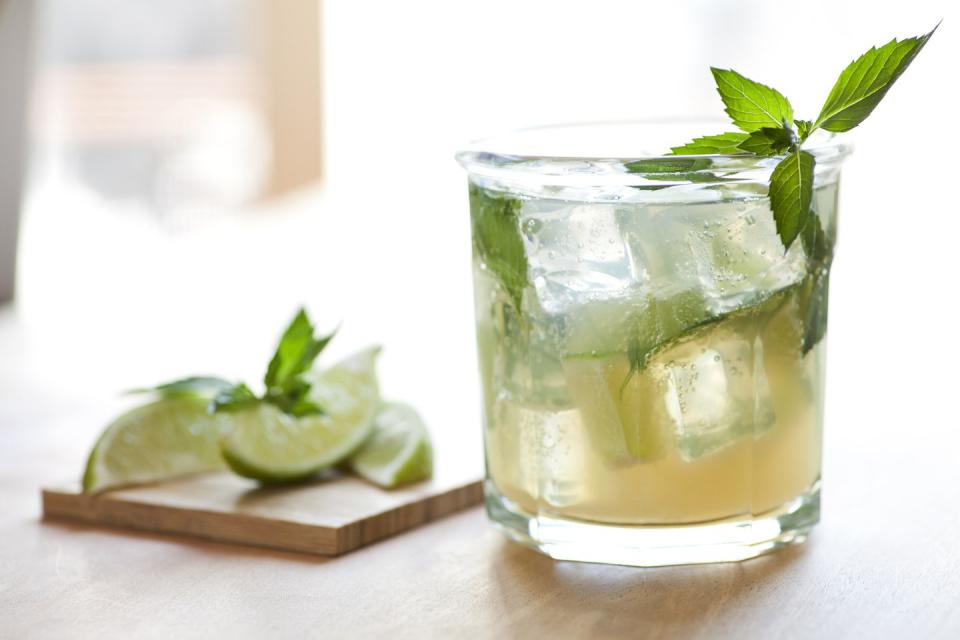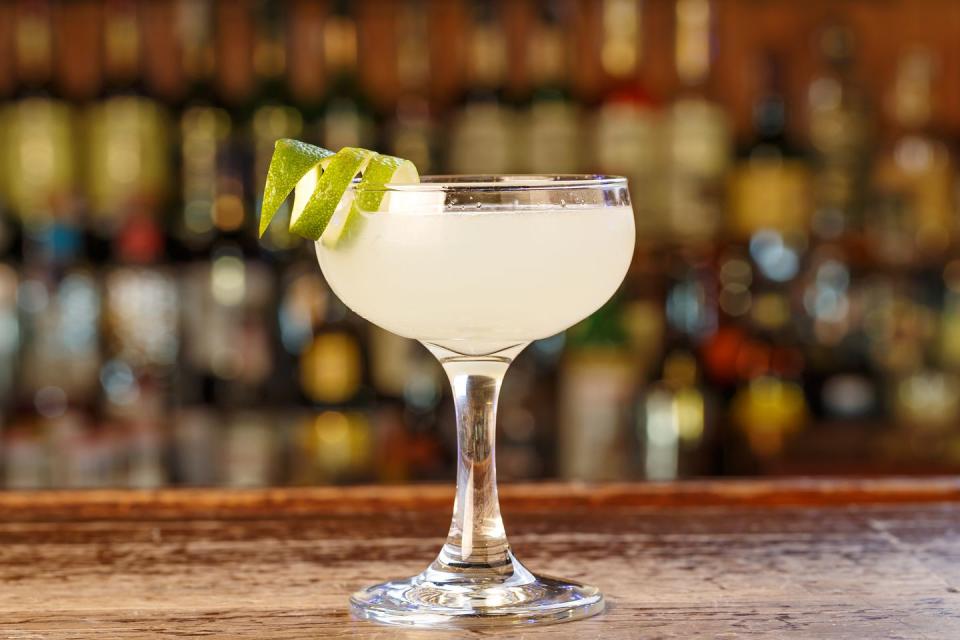Why Jamaican Rum Is the Best Kind of Rum to Drink

Rum is back, not that it ever really went away. Some of your favorite classic drinks like the Daiquiri, Piña Cola, Dark ‘N’ Stormy, and Mojito all have that one powerful spirit in common. You probably enjoy rum all the time, and more and more people are falling in love with it. You ought to make sure you're drinking the best.
Historically, Barbados is considered the birthplace of rum, but the island of Jamaica gets the credit for refining the rum-making process and putting rum on the map globally. Not only does Jamaican rum distinguish itself from others made throughout the Caribbean because of its taste, but this March, Jamaica held its very first Rum Festival to put the word out. When it comes to rum, Jamaica has strict standards for making high quality—if not the best—in the world, which cannot be said for other rums from many other places. Here’s the scoop on Jamaican rum and why you should be drinking it right now.
The History of Jamaican Rum
To make rum you need sugar, which was introduced to Jamaica in 1494 by Christopher Columbus, who transported it from the Canary Islands. When the British took over rule of Jamaica in 1655, they brought with them a working knowledge of rum-making and distilling from Barbados. In Jamaica, they were able to refine the process and grow the trade, and the rum industry boomed, in large part due to the role that slaves played in its production.
"Slaves are the godfathers of the rum business and kept it alive," says KK Hall, the global brand director of rums for the Campari Group, which imports Jamaica's Appleton Estate rum. “When the anti-slavery sentiment came to be and with slavery ultimately being abolished in the 1830s [in Jamaica], it really impacted rum, because slaves were the individuals who were really behind the crafting of rum."
The strength of the anti-slavery movement, as well as war between Britain and France, resulted in a massive decline in rum production in Jamaica by the late 1800s. In 1893, there were about 148 rum distilleries located throughout the island. By 1948, that number had dwindled dramatically to 25. Today, only four distilleries operate in Jamaica: Hampden Estate, Appleton Estate, Worthy Park Estate, and National Rums of Jamaica. But the quantity of rum produced has grown, as has the variety; Jamaica makes enough of the spirit to fill 20 Olympic-sized swimming pools every year, so they say, and it's sold in over 70 countries around the world.

What Makes Jamaican Rum Unique
Jamaican rum, which is considered full-bodied, is molasses fermented in large casks called "puncheons" and distilled in pot stills, a practice that dates back to the 17th Century. Full-bodied rums rely on natural, or what is referred to as "wild," fermentation that gives them a distinct flavor.
“The famous 'Jamaican funk' has been popular for centuries and oozes tropical fruits, wood, rubber, smoke, spices, and sweet caramel and molasses, perfect for blending, punches, and cocktails," Global Rum Ambassador Ian Burrell says. "Jamaican rums are also naturally sweet, as it is illegal to add sugar to Jamaica rums.”
Jamaican rum is also special because of the island's limestone, a mineral-rich sedimentary rock loaded with calcium carbonate.
“Jamaica is an ideal setting to grow sugarcane. It comes from what we call limestone water, which is also a requirement of Jamaican rum and Appleton Estate rum, which kind of softens the final product and makes it a little sweeter," says Hall.
There are other qualities that define Jamaican rum, outside of molasses and limestone water: It is made using all-natural, GMO-free yeast; it is aged in oak barrels; and at no point in the process are sugar or artificial flavors added. When flavor is added, like in the case of coconut rum, it is called “Flavored Rum” on the bottle, and the coconut flavor is all-natural.
"With the molasses and the limestone-filtered water, you have these raw materials that are brought through a process that we shepherd very, very closely," Hall says. "Just like making a fine wine or a single malt scotch, it’s handheld all the way through the process in a very careful manner, and a very quality-oriented manner.”
The final steps include blending the rums and then aging them, some for many decades.

How Much to Pay for Jamaican Rum
The prestige of the country of origin, the number of years a rum is aged, and the availability of a particular rum all play a role in how it is priced, and Jamaica holds the distinction of making the most expensive rum in the world. A bottle of Wray and Nephew rum from 1949 can be yours for a mere $54K. If you're wondering how much a good premium bottle of Jamaican rum will cost you that isn't a limited edition or highly aged bottle, Edward Hamilton, author of several books on rum, says that compared to other rums, "Real Jamaican rums are generally good value." Expect to pay $24-to-$60 retail for a minimally aged rum. "Of course, there are more expensive rums like those sold in the duty-free stores at the airport on Jamaica, where you are paying for fancy bottles, but you can find better rums from the distillers," he says.
How to Drink Jamaican Rum
How does a rum connoisseur prefer to drink his rum? Simple—with as little added to it as possible. (That includes as little Coke as possible.) Burrell, who is credited with creating the U.K. RumFest, the world's very first international rum festival, thinks that when trying Jamaican rums for the first time, it's best to keep it clean. “I always say your first experience of a rum should be neat. Then you can really taste it and appreciate the flavor,” he says.
The Best Jamaican Rums to Drink
If you're looking for a few choice Jamaican rums to try for variety's sake, Burrell offers his top five.
Wray & Nephew White Overproof Rum from Appleton Estate
At 63% ABV, this is the king of rums. Unaged, unadulterated, and untamed, it is the national rum of Jamaica, affectionately known as Uncle Wray.
Rum-Bar White Overproof Rum from Worthy Park Estate
If overproof rums are too strong for you but 40% ABV doesn't carry enough flavor, then this is the perfect rum. On the nose, it smells like a heavy Jamaican white rum, but on the palate it's light, fruity, and tasty.
Hampden Estate Pure Single Rum 46% ABV
The best-tasting and most versatile rum from the legendary Hampden Estate in Trelawney, Jamaica, this rum is a collaboration between famed rum bottler Velier and the Hampden Distillery. This is the type of rum that shouts Jamaican funk at you.
Appleton Estate 12 Year Old Rare Blend
Pound for pound, this is one of the best rums in the world. Tropically aged for a minimum of 12 years, this rum does everything. You can sip it neat, on the rocks, with a mixer, or in a cocktail.
Worthy Park Sherry Cask 57% ABV
This bottle is matured in ex-bourbon barrels for four years before being finished in a combination of PX and Oloroso sherry casks. Jamaican rums are not often aged in wine casks, but the sherry finish not only adds to the color, but it also adds loads of dark fruit and spice to the finish.
('You Might Also Like',)

